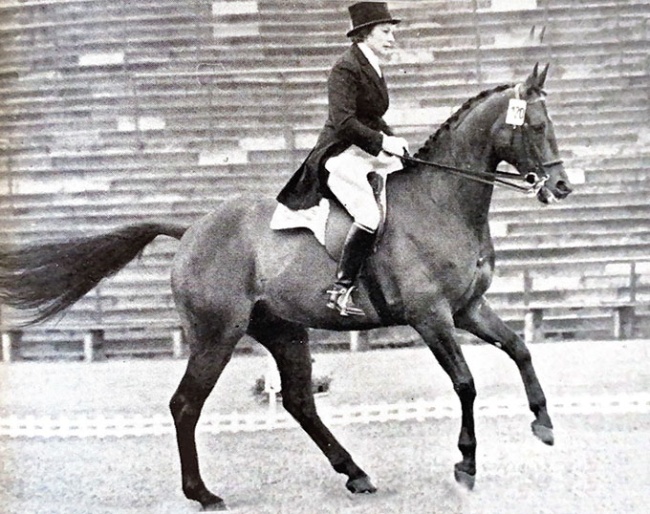
-- Text © Silke Rottermann for Eurodressage
When the British flag was raised and „God save our gracious Queen“ was played on the equestrian’s holy grounds of Aachen in 1958, dressage history was written in the truest sense of the word.
For the very first time a rider from the British Isles won the highly regarded Aachen dressage Grand Prix and this during a time in which the United Kingdom had just a handful of Grand Prix riders.
Now Britain’s dressage trailblazer, Joan Gold, has passed away at the age of 107.
German Training
Born on 8 May 1917 as Joan Cull, she started riding at a local yard as a child. When she was 16 her parents allowed her to continue her riding education in Germany, where Joan learnt German in the mornings and rode in the afternoons in a big riding club in Munich. There Major von Haugk, one of Germany’s talented cavalry riders, took the young girl under his wings and whetted her interest for a discipline which at that time was almost unknown in her own country.
Dressage was considered a "continental affair" and, at best, regarded suspiciously. In the homeland of hunting and steeple-chase, dressage was and remained the poor relation of Britain’s equestrian sport for decades to come.
When Joan returned home to Berkshire, she soon had two horses of her own to train: A Hungarian warmblood and an English thoroughbred. Equipped with the methodic continental approach which stood in sharp contrast to the typical individualism of her home-country at that time, Joan continued with her dressage. After having spent two winters training in Sweden, she became the very first British dressage rider at international dressage shows on the continent at just 21 years of age.
Competitive Career
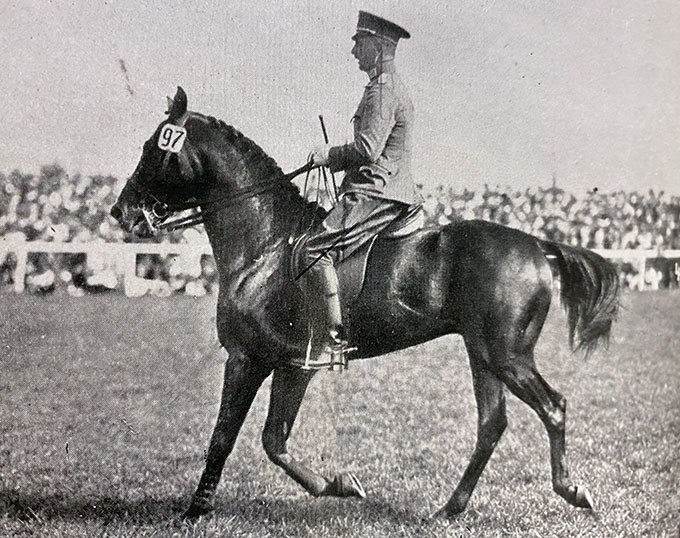
In Engand she trained with the Austrian Gustav Grachegg, a 1928 Olympic rider whom she described as a "horse psychologist" who used a very individual approach for each horse.
Joan’s marriage to Paddy Gold in 1939 and the outbreak of World War II not only interrupted the promising beginning of her dressage career for more than a decade, but Joan stopped riding altogether for the time being.
When the war was over, Joan, now a mother of three, took up riding again at the beginning 1950s and while out hunting she spotted a just 4-year-old thoroughbred which enchanted her like only love at first sight does. A few months after her first encounter with the elegant English thoroughbred Gay Gordon he was hers and she started to work with the brown gelding who turned out to be a handful at first.
Move to Berlin
When Joan’s husband became posted by the British army in post-war Berlin in 1954, Gay Gordon travelled with them and the combination soon found themselves under the tutelage of the Von Badewitz couple at the famous Deutschlandhalle.
Ines von Badewitz was already a successful dressage rider in post-war Germany, but appeared at championships level as member of the Austrian dressage team in the 1970s with the talented dapple grey Holsteiner Marquis. Back in the 1950s von Badewitz was also the trainer of a young Madeleine Winter (-Schulze) who became German champion with the small mare Coca-Cola at just 18 years of age.
Gay Gordon xx
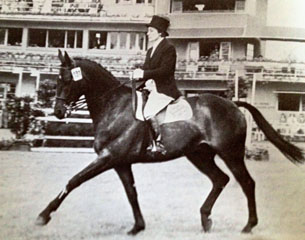
Gay Gordon xx was not yet ready for the 1956 Olympics in Stockholm where Lora Johnstone and Brenda Williams became the first British dressage riding Olympians with their thoroughbred horses. However that year Joan joined the British Dressage Committee and remained a member for almost four decades, retiring only in 1992.
In 1958, twenty years after Gold had debuted in international dressage, she was back, starting her campaign at the FEI championships, the predecessor of the European championships until 1963, in Wiesbaden. Gold and Gay Gordon came 9th in a field of 14 starters from 7 nations. While Gay Gordon xx had only come 9th in Wiesbaden, the legendary Aachen show at the end of June-beginning of July 1958 became the British couple’s big show-case, despite the less than ideal preparation.
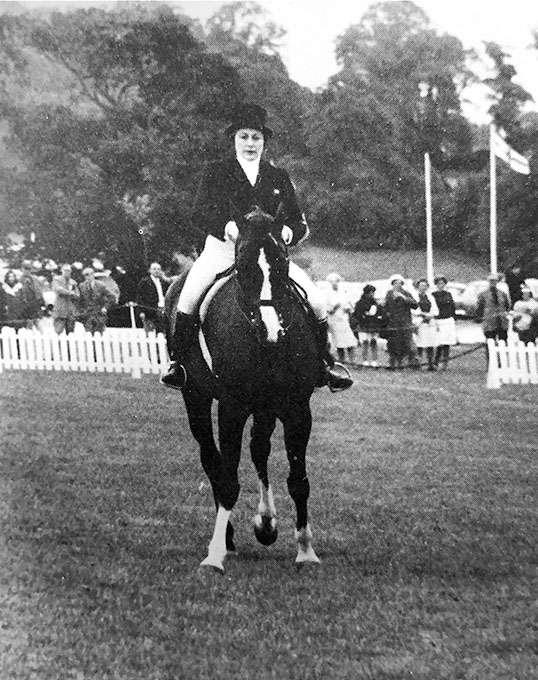
(Photographer uncredited, source: Neil Blake‘s
World of Dressage)
Lars Sederholm & Alison Oliver
At Aachen 1958 Joan also met a young man from Sweden: Lars Sederholm who was the traveling groom ofSwedish quadruple Olympic champion Henri St.Cyr. Sederholm longed to become a trainer in the homeland of equestrian sport. For the next four years Lars - who would become the probably most renowned eventing coach of his time - worked at Joan Gold’s stables in Warfield, before leaving for the Waterstock House Training Centre of his future wife Diana’s family in 1962 which he would turn into a world renowned training place in the decades to come.
During Sederholm’s time at Gold’s stables Lars was joined by the young Alison Oliver who ran the stables after Sederholm left and who became world famous as Princess Anne's trainer from 1967 on.
Trainer
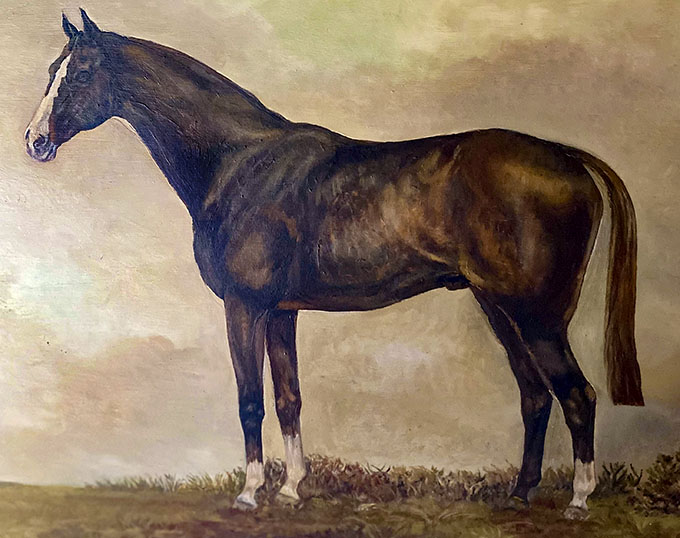
by Anne Side
One of these was one of today’s British top dressage trainers, David Hunt, who initially went to Alison Oliver as a working student at the end of the 1960s and then got hooked on dressage by watching Joan train her two dressage horses whom she still kept for herself at that time.
„Joan was an amazing woman," David told Eurodressage. "She made the horses dance and I got more and more fascinated by dressage. When I was in my early twenties, Joan offered me the ride on her Grand Prix horse Roman Holiday and supervised our training. That was a great chance for me and it gave me some of those aha-moments which you need when you are young and rather new to the sport."
Multiple British dressage Olympian, visionary breeder, and former I-judge Jennie Loriston-Clarke mentioned in her dressage manual "Dressage Riding" how indebted she was as a young upcoming dressage rider when Joan Gold allowed her to refine her aids for the flying changes on the retired Aachen champion Gay Gordon.
International Judge, Chef D'Equipe
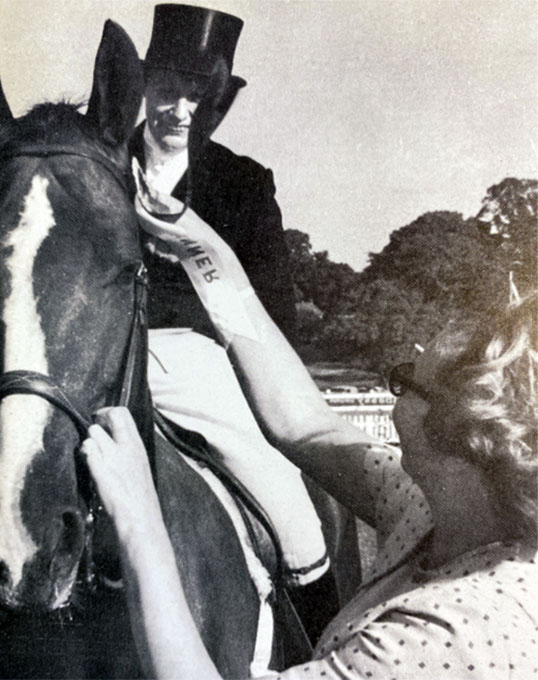
uncredited, source: Neil Blake‘s World of Dressage)
International judges’ schooling was still very much in its infancy in the 1960s, but Joan was at the cavalry school in Berne when the first took place there. Her international judges’ career lasted until she turned 70, back then the age limit, but she continued to judge nationally and also encouraged others to follow in her judging footsteps, among them Olympic judges Stephen Clarke and Andrew Gardner.
In the 1980s Gold was very active with judging The Haig International Dressage Cup, a series introduced by the FEI in 1982 in order to increase the popularity of the discipline world-wide. Non Europeans countries, put together in areas, could take part at PSG or elementary level and had a clinic with the international judges the day after the competition.
In an interview she gave the British magazine „Dressage“ in its April 1992 issue, Gold said that „as a judge I regret that so many riders fail to carry on a conversation between their hands and the horse’s mouth. The hands can feel what the horse is feeling and vice versa.“
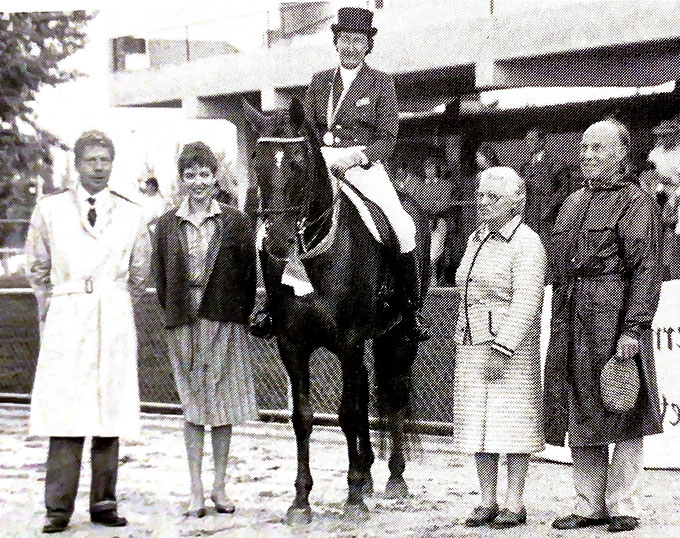
Haig Cup in Australia. The winner was Erica Taylor
with her TB stallion Crown Law xx who later went to
the 1986 World CH and 1988 Olympic Games
A compliment which also Ruth Klimke, widow to Dr. Reiner Klimke who competed alongside Gold and later was judged by her, shared. "I love to remember Joan who I saw at Aachen and several other shows where we had been. Her empathy with the horse was very touching for me. Joan truly was an admired personality of dressage," Ruth told Eurodressage.
From dressage being widely ignored as a discipline by her riding compatriots when she first contested on the continent in the 1930s to British riders winning their first international medals, it has been the recently decedent in various functions that accompanied and stamped this amazing development of British dressage within just a few decades.
A wonderful exponent of classical riding, Joan Gold was an inspiration to so many. May her lifetime achievements not be forgotten!
-- Text © Silke Rottermann for Eurodressage - Photos © private, Max Amman, uncredited
References
- Anne Ince, „The voice of experience“, in: Dressage, April 1992 issue, pages 34-37.
- Interview with David Hunt on 2nd October 2024.
- Interview with Ruth Klimke on 3rd October 2024.
- https://www.britishdressage.co.uk/news/in-memoriam-joan-gold/
- Jane Kidd, Horsmanship in Europe, J.A. Allen,London 1977, p. 195-204.
- Ann Martin, The Trainers, Stanley Paul&Co.Ltd., London 1972, p. 50-52 and p. 59-61.
Related Links
The History of British Dressage: "I Thought We Would Get There...In 100 Years!"
Dujardin Strikes Back and Wins 2014 CDIO Aachen Kur to Music
From Flying Past to Flying Change - Part III: The Thoroughbred from the Post-War Times into the 1960s
Scores: 1985 European Pony Championships